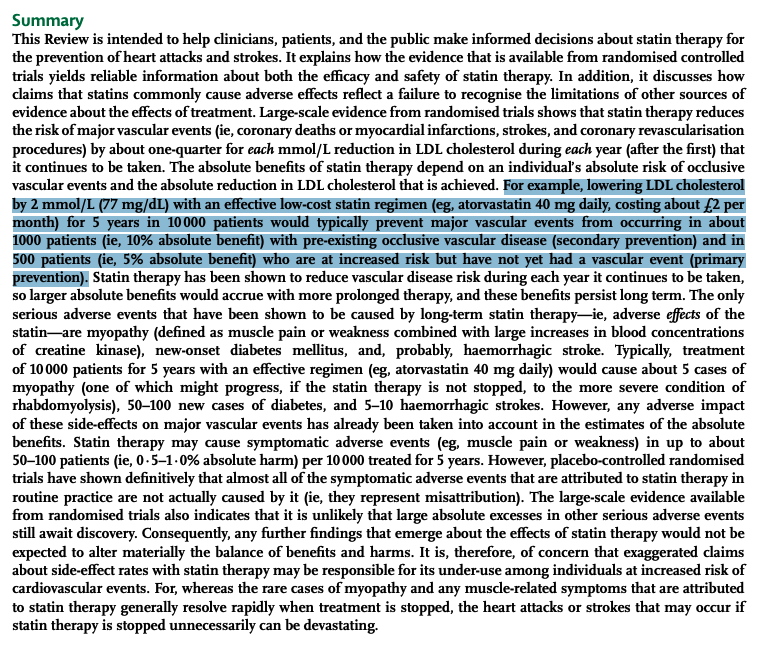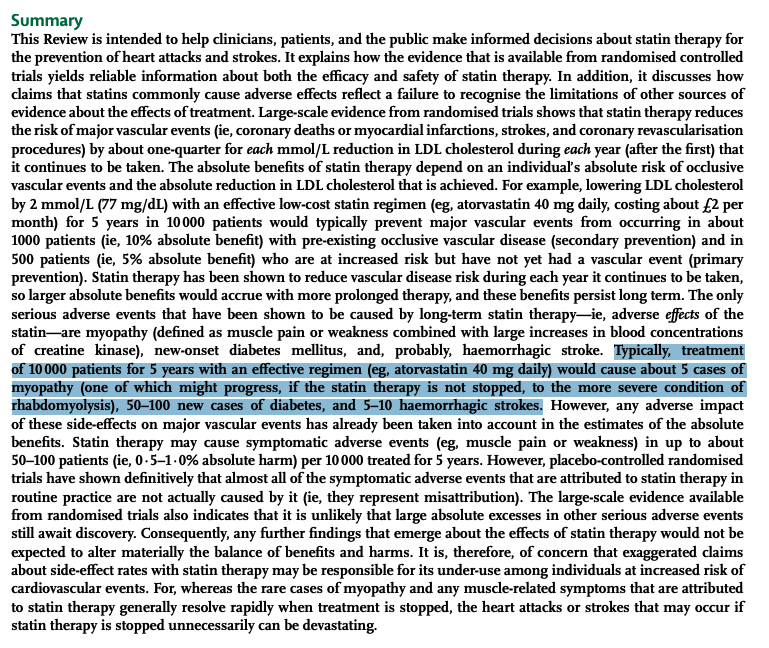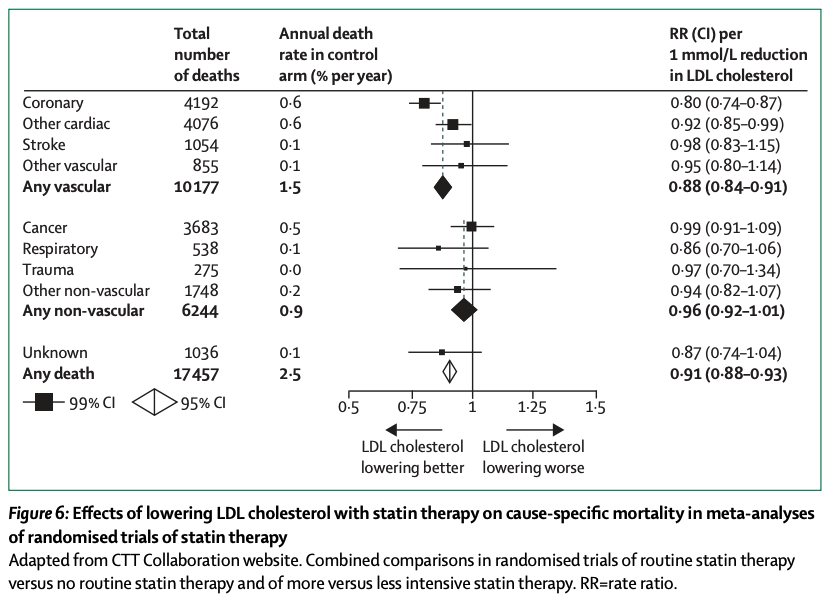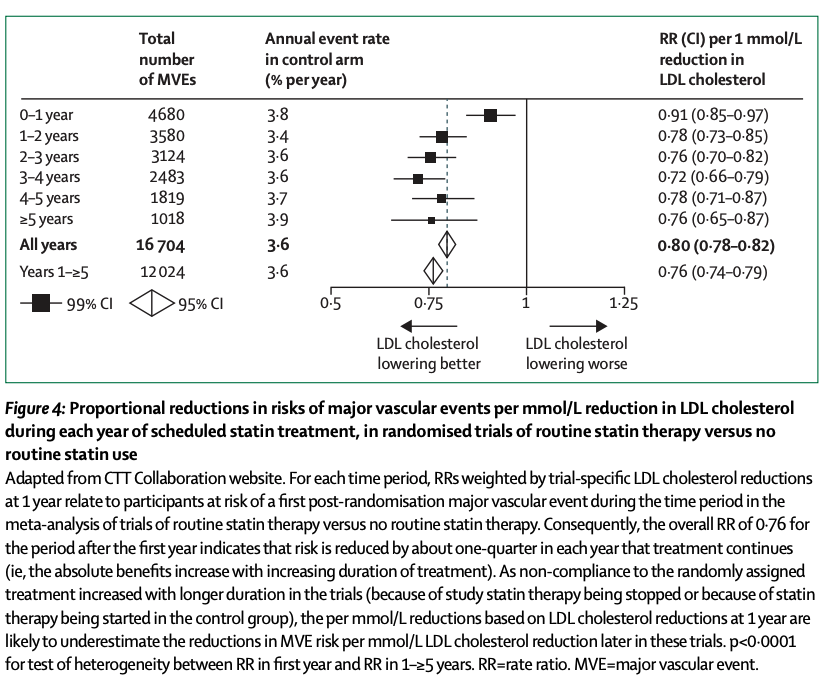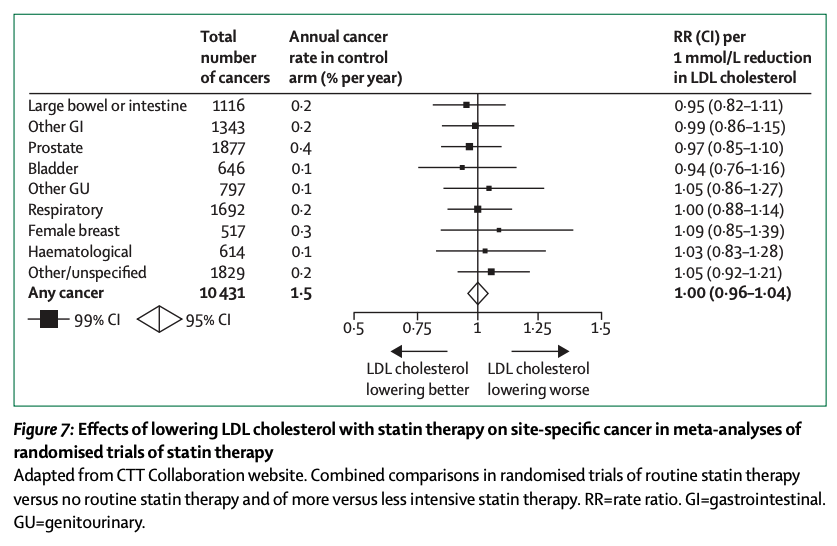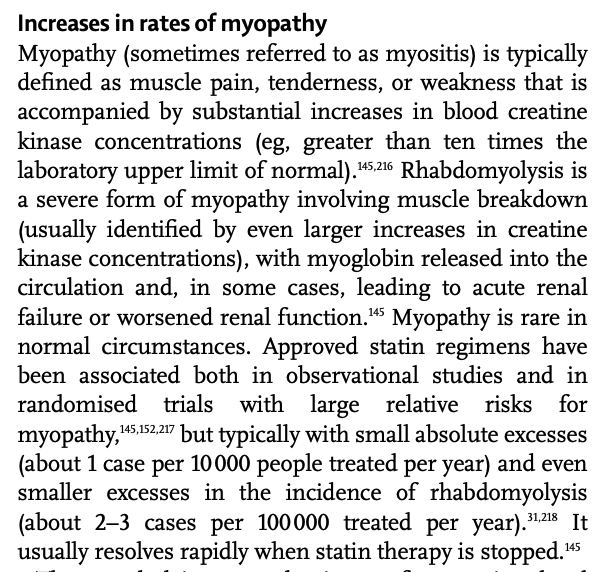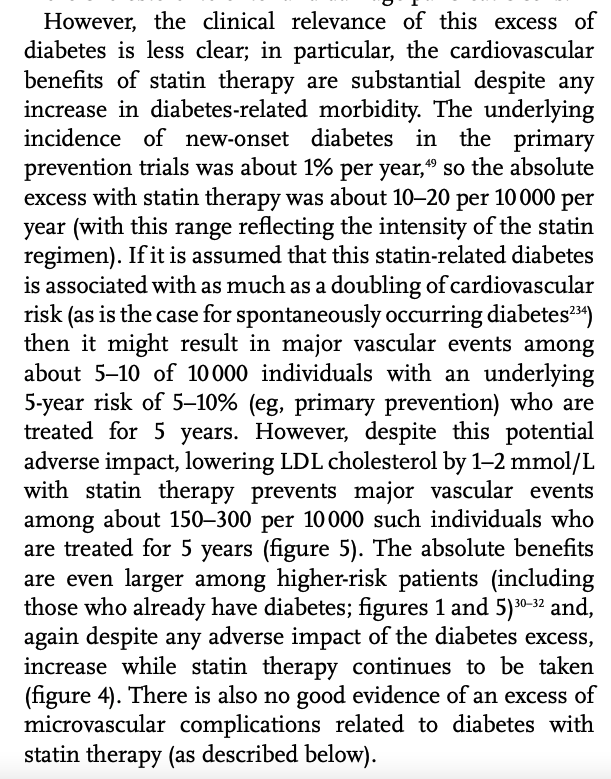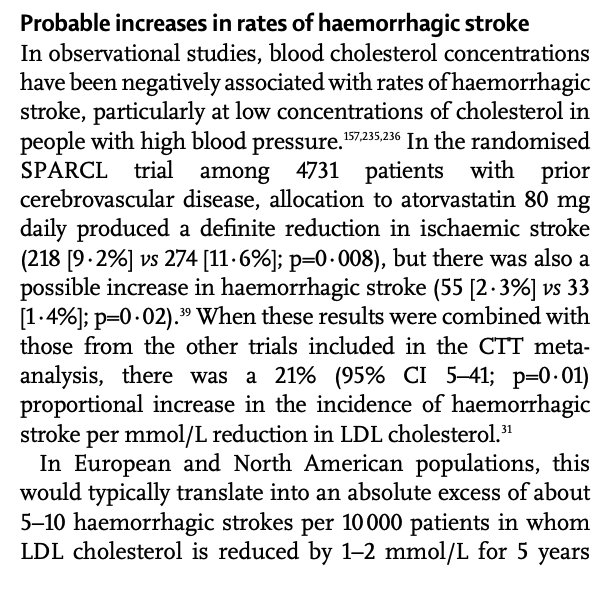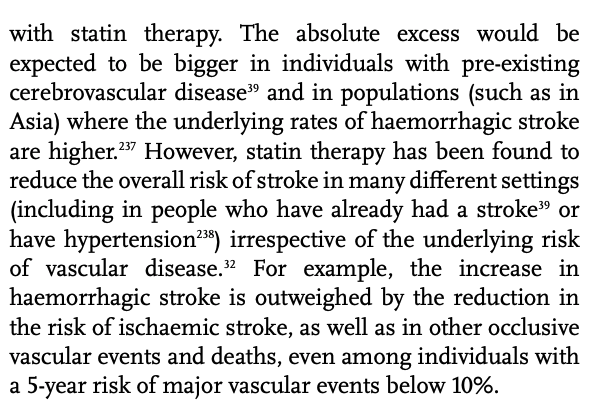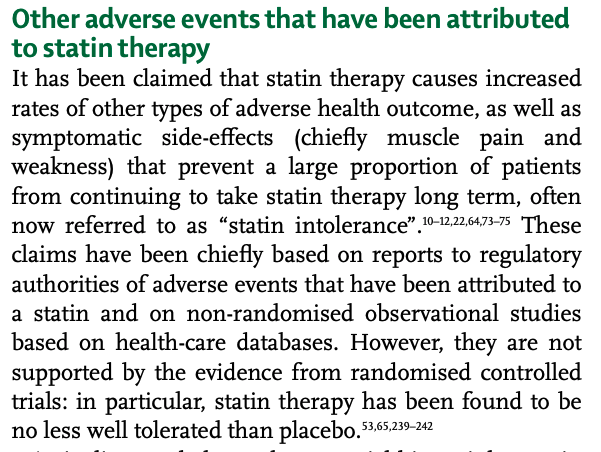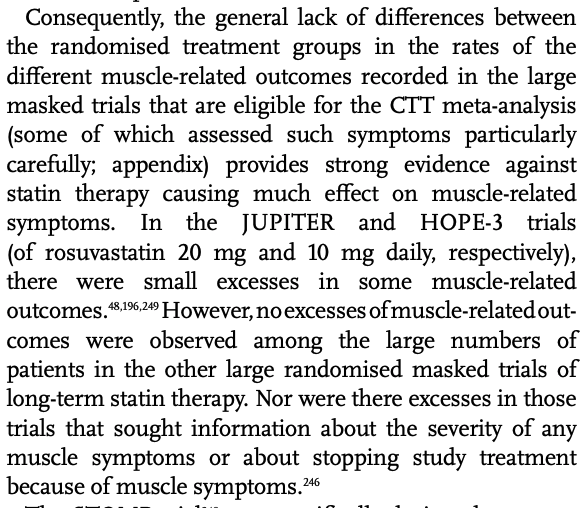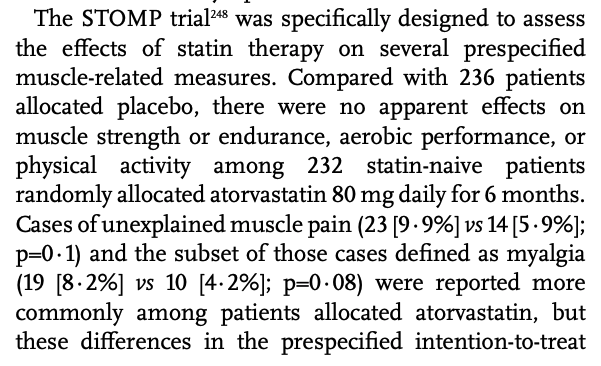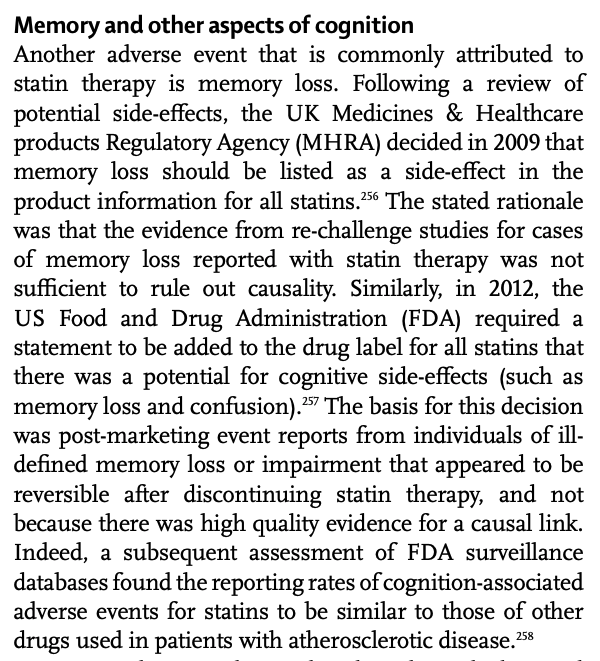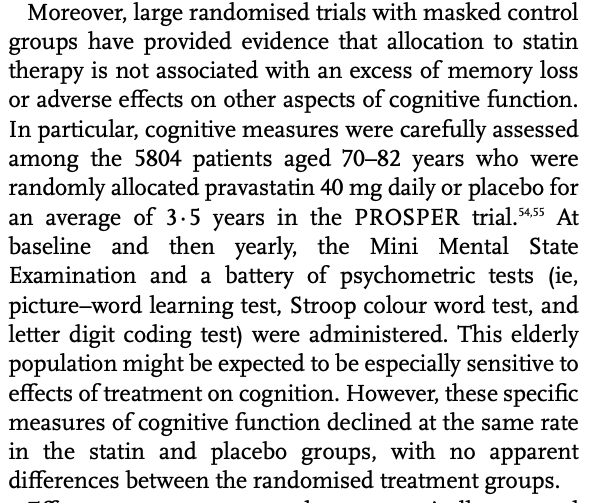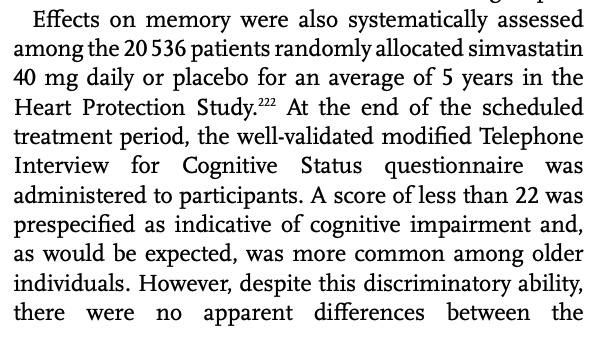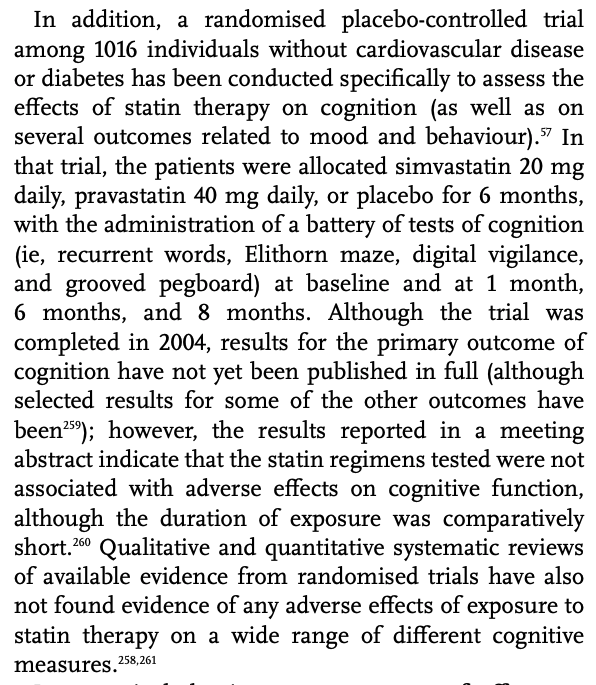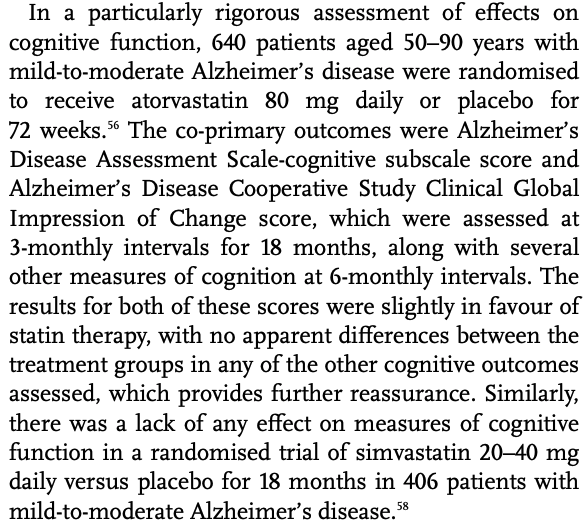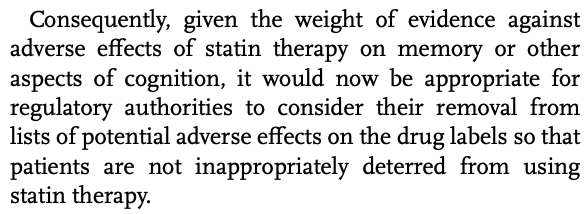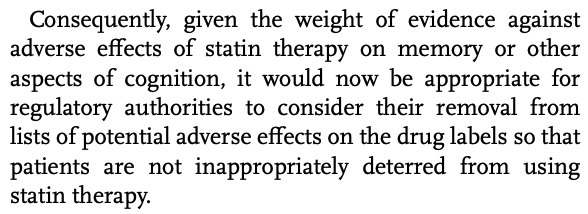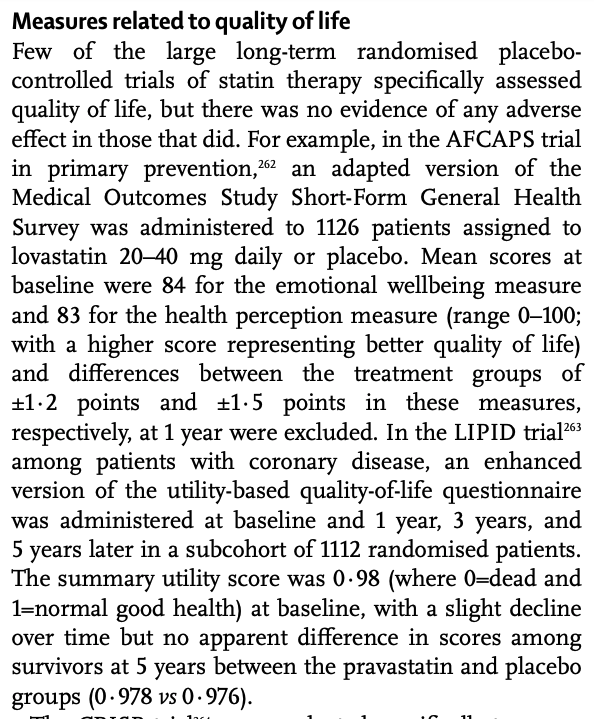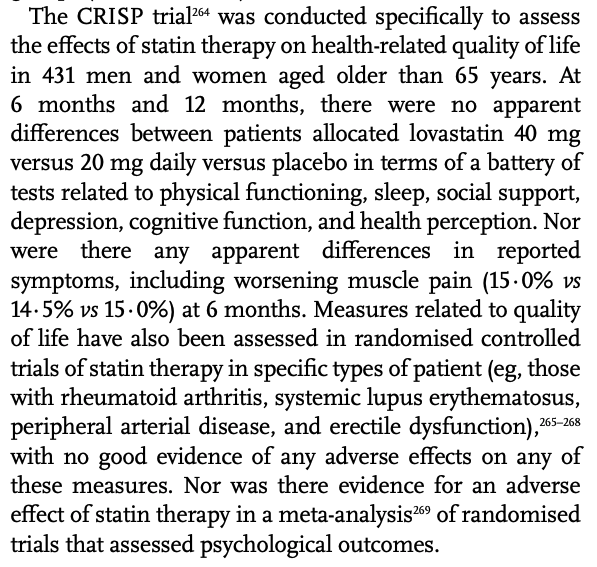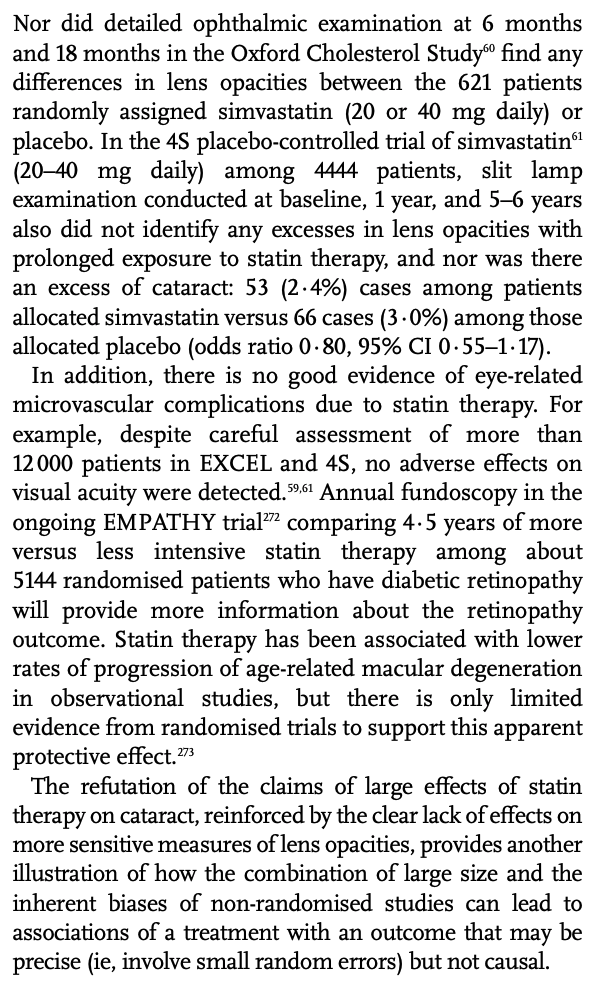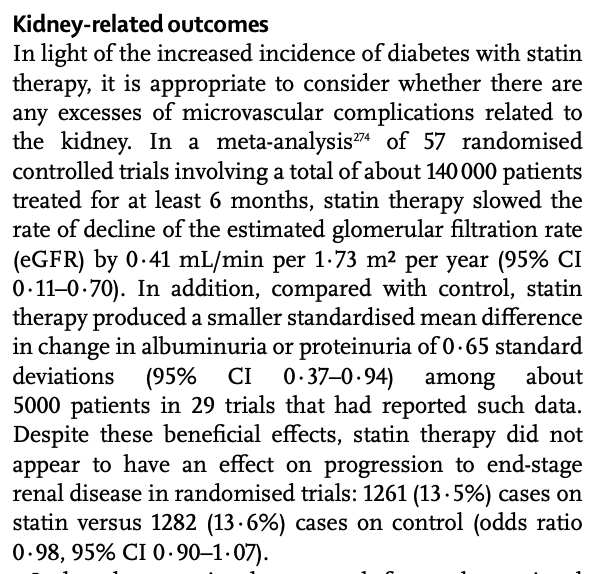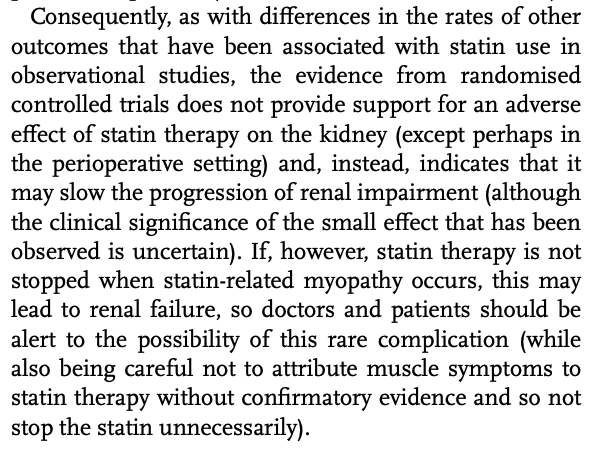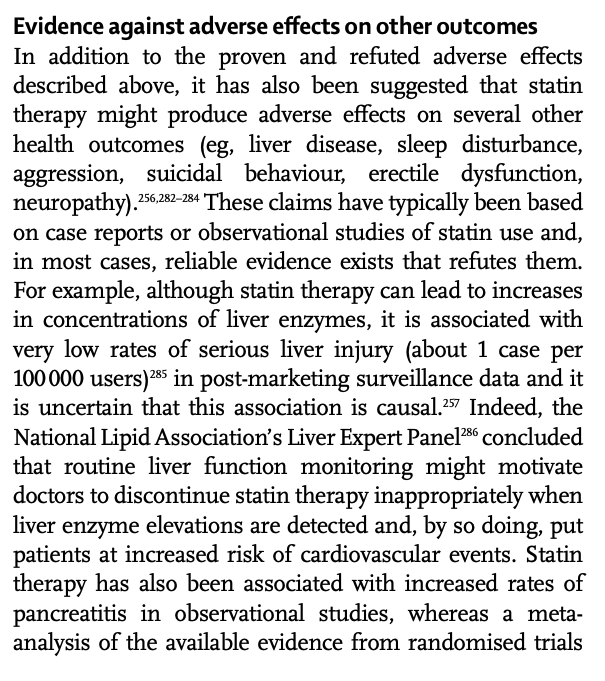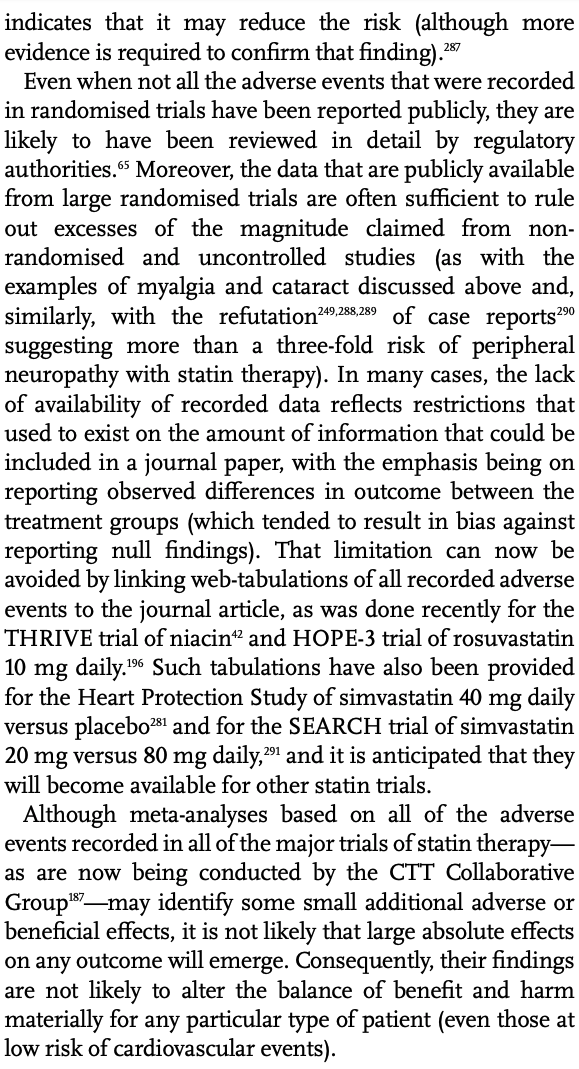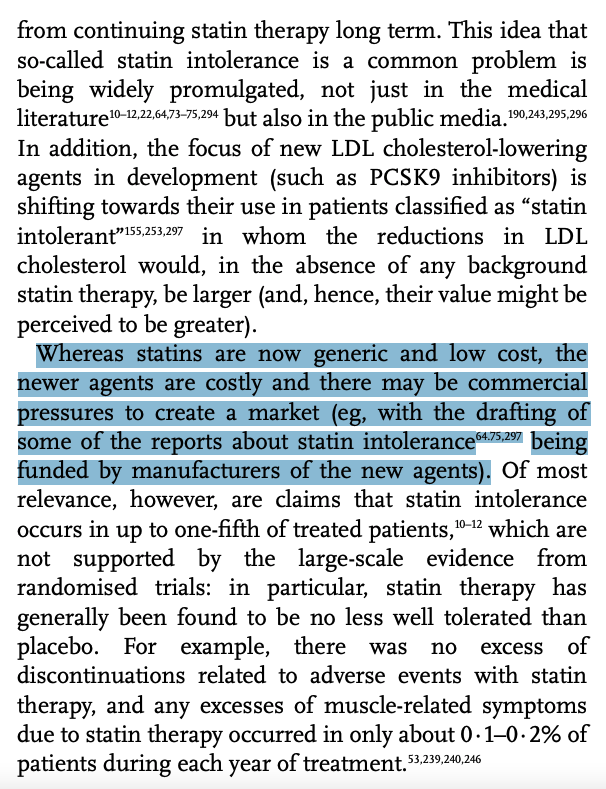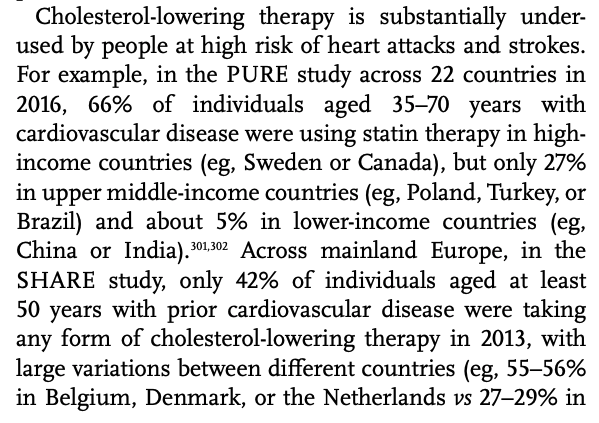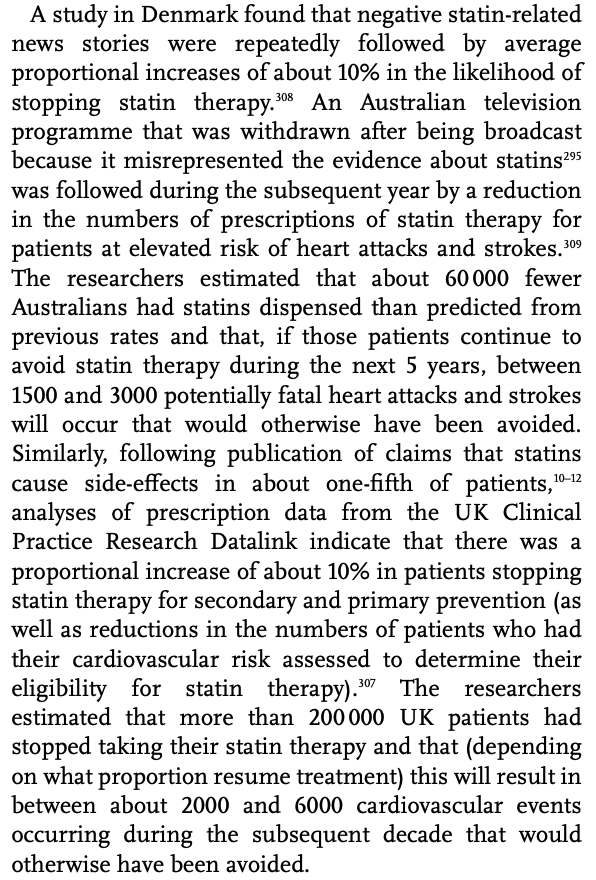I will do a brief thread on this paper which @POhukainen and @DrNadolsky I think recommended to me. It's about statins and is considered a "definitive" paper. In this thread I will simply go over the main points & those that are most provocative.
https://www.thelancet.com/journals/lancet/article/PIIS0140-6736(16)31357-5/fulltext

1/n
https://www.thelancet.com/journals/lancet/article/PIIS0140-6736(16)31357-5/fulltext

1/n
Lowering LDL cholesterol by 77 mg/dL with an effective statin regimen for 5 years would typically prevent major vascular events from occurring in one-in-ten with pre-existing disease and in one-in-twenty at increased risk without an event. These benefits increase over time.
2/n
2/n
The same treatment would cause:
myopathy in 1-in-2000;
diabetes in between 1-in-100 and 1-in-200; and
hemorrhagic stroke in 1-in-1000 to 1-in-2000.
3/n
myopathy in 1-in-2000;
diabetes in between 1-in-100 and 1-in-200; and
hemorrhagic stroke in 1-in-1000 to 1-in-2000.
3/n
Statin therapy produces large benefits for cardiovascular disease but there is no good evidence that it has benefits for other outcomes.
4/n
4/n
Reduction in cardiovascular events from statins is related in a dose-response manner to the reduction in LDL cholesterol.
6/n
6/n
Each decrease in LDL cholesterol produces additional benefit; each year on statin therapy produces additional benefit.
7/n
7/n
Statin therapy does not affect cancer risk, in either a good or a bad direction. It has no effect at all.
8/n
8/n
Myopathy is a proven (rare) risk of statin therapy and occurs at a rate of about 1-in-10000 for each year of statin use. It usually resolves rapidly when statin therapy is stopped.
9/n
9/n
Diabetes is another (uncommon) risk of statins, at about 1- or 2-per-1000 patients per year. However the major complication of diabetes is cardiovascular, and statins reduce CV events even in diabetes.
This makes diabetes risk from statins of uncertain clinical importance.
10/n
This makes diabetes risk from statins of uncertain clinical importance.
10/n
There may be an increased risk of hemorrhagic stroke but decreased risk of ischemic stroke. Overall the increased risk in hemorrhagic stroke is overwhelmed by a much more massive overall cardiovascular disease benefit.
It is a tradeoff.
11/n
It is a tradeoff.
11/n
Overall, statin intolerance is rare and similar rates of intolerance are found in the placebo and statin arms of clinical trials with statins. This suggests that most reports of statin intolerance are due to nocebo and other effects, not statins themselves.
12/n
12/n
Randomized controlled trials fail to find any difference in myalgia (muscle pain) between statin-treated and placebo-treated groups, suggesting that muscle pain from statins is not due to the statins themselves but other factors such as nocebo.
13/n
13/n
The STOMP trial looked at muscle-related outcomes such as strength, endurance, sports performance, and physical activity and saw no difference between the statin-treated and placebo groups.
14/n
14/n
A meta-analysis of 26 trials of over 100,000 patients showed little difference in muscle pain after 3 years of treatment. Statistically, about 1-in-1000 patients, though the result was not statistically significant.
15/n
15/n
Crossover trials among patients who repeatedly report intolerance to statins due to muscle pain show that these patients usually cannot distinguish between the impact of placebo and statins on their muscle pain, though a small % can.
16/n
16/n
The above findings indicate that muscle pain greater than placebo probably exists but is rare. Among those in whom it occurs in the real world, most of the time it is due to nocebo and not the statin.
17/n
17/n
Of the between 1-in-1000 and 1-in-500 patients who experience muscle pain in excess of placebo, only about 5-10% of these cases require stopping the statin due to risk of rhabdomyolysis.
18/n
18/n
Memory loss is an oft-cited side-effect of statin therapy and is reported in observational studies but no effect is found in randomized controlled trials.
For example
19/n
For example
19/n
Among 5804 patients aged 70-84 randomized to statin or placebo, a battery of psychometric tests showed no difference in cognitive function at 3.5 years.
20/n
20/n
A larger study of more than 20,000 patients randomized to statin therapy or placebo showed no difference in the development of cognitive impairment or dementia over the course of 5 years.
A subgroup analysis of patients aged 75-85 showed the same result.
21/n
A subgroup analysis of patients aged 75-85 showed the same result.
21/n
Two trials in Alzheimer's patients indicated a possible modest potential benefit for statin therapy, consistent with the fact that cerebrovascular disease (vascular disease in the brain's blood vessels) contributes to dementia and statins improve cerebrovascular disease.
23/n
23/n
Strong evidence shows that statin therapy does not cause an increased risk of cognitive impairment or memory loss or dementia in randomized controlled trials and may do the opposite.
24/n
24/n
A decline in reported quality of life is not associated with statin therapy in the clinical trials that looked at this outcome.
25/n
25/n
Continuing in a moment...
26/n
26/n
CRISP trial evaluated quality of life specifically. It found no difference in physical functioning, sleep, social support, depression, cognitive function, and health perception at 6 and 12 months among 431 patients randomized to statins or placebo.
27/n
27/n
Statins have been associated with increased risk of cataracts from observational studies, but observational studies are biased, and randomized controlled trials have indicated no effect or a very small one.
28/n
28/n
Statins probably slow the progression of kidney disease in randomized controlled trials but to uncertain clinical benefit.
29/n
29/n
Statins may be associated with other effects like liver disease, sleep disturbance, aggression, suicidal behaviour, erectile dysfunction, neuropathy, but these are almost certainly small and will not alter the current risk-benefit from statins, even in low-risk patients.
30/n
30/n
Statins are associated with overwhelming benefit yet modest or rare side-effects, making the risk-benefit calculation clear in favor of statins in most patients at risk of cardiovascular disease.
31/n
31/n
Among a million patients taking statins, about 20,000 would avoid major vascular complications for each year that statins are continued.
32/n
32/n
But statins are off-patent and cheap. Reports on statin intolerance are funded by pharma in an effort to sell more expensive drugs.
33/n
33/n
Statin therapy is massively underused among patients with pre-existing cardiovascular disease even in countries with advanced economies and ready access.
34/n
34/n
Negative media attention about statins causes people to discontinue their statin therapy and likely results in thousands of excess major vascular events (like heart attacks) around the world.
35/35
/end
35/35
/end

 Read on Twitter
Read on Twitter
